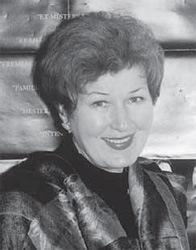|
|
Litauen I Lithuania
Neues vom litauischen Film

Die künstlerische Entwicklung des litauischen Kinos ist sehr dynamisch, doch ein Faktor ist konstant: der Mangel an Finanzen. Die Höhe der jährlichen Unterstützung durch den Staat (1,27 Millionen Euro) ist seit fast zehn Jahren gleich geblieben, deshalb wurden in den Jahren 1998 bis 2004 nur acht Spielfilme in Litauen gedreht.
Sarûnas Bartas’ neuer Film „Sieben unsichtbare Männer“ war der erste, der 2005 auf dem Festival von Cannes gezeigt wurde. Der französische Kritiker Olivier Seugret hält Bartas für einen der größten modernen Regisseure, für einen Rembrandt des Kinos. Der neue Film von Algimantas Puipa, „Forest of the Gods“, hatte seine Premiere in Montreal. Den größten Erfolg erlebte der Film jedoch in Litauen: Nach zehn Tagen hatten ihn bereits 17.500 Menschen gesehen. Ein Rekord für Litauen, wo es 2004 nur 1,5 Millionen Kinobesuche gab. Das große Interesse am Film erklärt sich daraus, dass er auf dem Buch des litauischen Schriftstellers Balys Sruoga basiert. Er schrieb es, nachdem er drei Jahre im Konzentrationslager Stutthof verbracht hatte. Regisseur Audrius Juzenas befindet sich in der Schlussphase seines Films „Ghetto“, der auf einem Stück von Joshua Sobol basiert. Hintergrund sind wahre Begebenheiten, die sich während der Besatzung durch die Nazis 1942/43 im jüdischen Ghetto von Vilnius abgespielt haben. Der zweite Film „You and I“ von Kristijonas Vildziunas (in Lübeck war sein Debüt „Der Mietvertrag” zu sehen) handelt von den Problemen des modernen Lebens.
Es ist interessant, dass zuletzt zwei Generationen litauischer Regisseure von sich reden gemacht haben: In Lübeck gern gesehenen Gästen wie Sarunas Bart, Audrius Juzenas, Audrius Stonys, Arunas Matelis, Kristijonas Vildziunas und Valdas Navasaitis wurde dabei oft der Vorwurf gemacht, ihre Filme nur für Festivals zu drehen, ohne die litauische Realität zu reflektieren. Daneben sorgt eine andere „Welle“ von Regisseuren – wir könnten sie als jung und wild bezeichnen – für Aufmerksamkeit. Sie erzählen dem Publikum, was hier und heute geschieht. „Ich habe es satt, dass in litauischen Filmen nichts passiert“, sagt ihr prominentester Vertreter Ignas Miskinis. Sein Film „Easily and Sweetly“ (2003) ist zu einer Art Manifest der jungen Generation geworden. Sich aufbäumen, mutig sein – das ist das Motto des Regisseurs. Hoffen wir auf mehr Neuigkeiten vom litauischen Film.
Dr. Grazina Arlickaite
Lithuanian Film Studio
News in the Lithuanian cinema
The artistic situation of the Lithuanian cinema is quite dynamic; however, one factor always remains stable: the lack of finance for film production. The annual state support for the film industry (1,269,694 euros) has not changed for nearly ten years now. That is the main reason why only 8 features were produced in Lithuania between 1988 and 2004.
“Seven Invisible Men” by Sarûnas Bartas was the first Lithuanian festival entry in 2005, screening at the Cannes International Film Festival (in the Quinzaine). French critic Olivier Seguret, writing in “Liberation”, calls Bartas one the greatest modern portraitists, a Rembrandt of the cinema. The latest film by Algimantas Puipa, “Forest of the Gods”, had its international premiere at the Montreal festival before coming to Lübeck. However, its greatest success so far has been in Lithuania. During the first 10 screening days 17,500 thousand people saw the film, a record for Lithuania where there were only 1.5 million admissions during the entire year of 2004. The film’s main interest lies in the fact that it is based on
the book “Forest of the Gods” written by Lithuanian writer Balys Sruoga after he had spent three years in the concentration camp at Stutthoff. Director Audrius Juzenas is currently finishing his film “Ghetto”, based on a play by Joshua Sobol. It describes real events that took place in the Jewish Ghetto in Vilnius during the years of the Nazi occupation from 1942 to 1943. A second film, “You Am I”, directed by Kristijonas Vildziunas (his debut film “The Lease” was shown in Lübeck in 2002) deals with the problems of modern life.
It is interesting that during the ten years of independence two different generations of Lithuanian directors have come to the fore. Frequent guests of the Nordic Film Days Lübeck such as Sarûnas Bartas, Audrius Juzënas, Audrius Stonys, Arunas Matelis, Kristijonas Vildziunas and Valdas Navasaitis have received international recognition, but have often been criticized for making films for festivals only and failing to reflect the reality of Lithuania. However, another “wave” of directors – we could call them young and furious – are also making themselves known. They tell the audience what is going on here and now. “I am tired of Lithuanian films where nothing happens,” says one of their most prominent representatives, Ignas Miskinis. His thesis film “Easily and Sweetly” (2003) has become a manifesto of the younger cinema generation. Defiant, sultry, brave – that is the motto of the director. We are looking forward to further innovations in Lithuanian cinema.
Dr. Grazina Arlickaite
Lithuanian Film Studio
|



